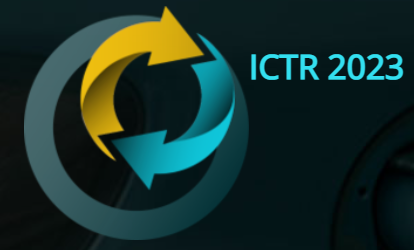
DESTI-SMART results to be presented at the 11th ICTR
DESTI-SMART results to be presented at the 11th International Congress on Transportation Research, to be held in Crete, Greece, on 20-23 September 2023.
DESTI-SMART is a project addressing challenges for efficient sustainable tourism and at the same time promotion of low-carbon ecconomy through sustainable mobility and accessibility. Public regional/local and transport authorities increasingly face such challenges, particularly at busy destinations with high tourism travel flows. The 9 project partners, representing mass tourism destinations in South Europe, emerging tourism destinations, coastal, maritime and insular ones, form an interregional working sceme promoting interregional cooperation for sustainable mobility, accessibility and low-carbon responsible travel, through capitalisation of best practices, improvement of regional/local policy instruments and preparation of action plans towards their emergence and recognition as 'Smart Destinations'. The partnership includes an advisory partner with specialisation in tourism mobility. The project is managed and coordinated by a Management and Coordination Unit of exeternal experts with substantial experience in management, sustainable tourism and transport planning.
Overall objective of DESTI-SMART
To improve the transport and tourism policies of EU destinations, by integrating strategies for sustainable mobility, accessibility and responsible travel with efficient & sustainable tourism development, for transition to a low-carbon economy, through efficiency, resilience, multimodality, novel low-carbon transport systems, cycling & walking, with implementation innovations, policy learning and capacity building.
Promoting Sustainable Mobility and Accessibility with low-carbon transport in tourism destinations is a theme that has not been given the emphasis that it deserves, particularly in busy destinations with high tourist flows at peak seasons. This is particularly the case in coastal, maritime and insular destinations of South Europe, where peak summer demand is greater and transport systems are often inadequate. Transport planning is usually geared to the normal travel demand of residents and businesses, with the special needs of tourists frequently overlooked, underestimated or given inadequate attention. Visitors, usually foreign, are not very familiar with the destination transport networks and language, but have to use the available facilities for their mobility. There is a large scope for shifting travel demand to low-carbon transport solutions in tourism, with significant quality of life, socioeconomic, environmental and climate action benefits. The increase in holiday travel, shortbreaks and day visits increases accessibility and mobility problems in destinations at different territorial levels (ie countries or regions, tourist districts or single resorts). There is a strong need for adequate policies at all levels. Instruments include passenger intermodality improvements, public transport, encouragement of environmentally friendly low-carbon tourism mobility, Intelligent Transport Systems (ITS) development and harmonization, Mobile Aplications, etc. Efficient transport policies have to consider the whole travel chain and be customer oriented, taking into account the needs of all tourists as well as residents. In particular, the following pressing issues need to be addressed, through interregional cooperation with innovations towards a low-carbon economy in EU destinations:
A. Investments in and provision of low-carbon transport systems, with the needs of visitors explicitly taken into consideration, including internalisation and reduction of external costs of transport by mode shift to low-carbon travel solutions and E-Mobility.
B. Interchange between long-distance travel and local transport services, including Intermodality facilities for visitors, multimodal connectivity improvements that would shift travel demand to low-carbon transport.
C. Accessible tourism facilities for visitors with mobility difficulties (disabled, elderly, families with young children, etc).
D. Cycling & Walking for Tourists, Cycling routes provision, Shared bikes, CycloTourism, integration of cycling in tourism mobility strategies, promoting ‘Greenways’.
Europe 2020 growth strategy aims for the EU to become a smart, sustainable and inclusive economy. The project has clear and strong links, in terms of transport and tourism sustainability and it addresses four of the EU2020 objectives, on employment (policy instruments on Growth & Jobs), innovation (comprehensive novel tourism mobility solutions), social inclusion (through accessibility for all) and climate/energy (through low-carbon transport). Interreg Europe Priority Axis 3, Investment priority 4(e) promotes low-carbon strategies including sustainable multimodal mobility, with mitigation and adapatation measures. This covers all types of territories and tourism destinations must not be left out.
€1,777,510.00
Low-carbon economy
The project approach is to seek and facilitate increased interaction, cooperation, innovations and integration between the tourism and transport sectors at destination regions, around priority key themes that are expected to contribute towards the transition to a low-carbon economy, through sustainable mobility and accessibility solutions. The key priority themes are: A. Low-carbon transport systems introduction investigation, including internalisation and reduction of external costs of transport for tourism and travel with low-carbon solutions, E-Mobility options, promoting the use of railways for access to destinations where possible, redeployment of disused railways for sustainable tourism development and non-motorised transport. B. Provision of improved Intermodality facilities for visitors, multimodal connectivity improvements, interchange facilities between long distance travel and local transport systems, including multilingual travel information provision, integrated e-ticketing for tourism sites and public transport, CycloTourism interchanges with public transport, awareness raising, promotion of low-carbon modes of travel, ICT & mobile applications, Mobility as a Service (MaaS). C. Accessible Tourism: Accessibility for tourists with mobility problems (disabled, elderly, families, etc). D. Facilitating Cycling & Walking for Tourists, cycling routes provision, shared bikes, promotion of CycloTourism, integration of cycling in urban/regional tourism mobility strategies, promoting ‘Greenways’. The project approach involves the following 12 activities, in order of appearence: 1. Review, identification, documentation of key policies and best practices from previous, completed projects for capitalisation; key issues and available policy options review and assessment. 2. Development of linkages and synergies amongst specific clusters, such as: Regional Authorities, Local Authorities, Transport Authorities, Tourism Boards, Development Agencies, Transport operators, as well as by type of tourism destination (coastal & maritime, urban, rural, mountainous, insular) and low-carbon transport modes and options (Electro-Mobility, Railways, Cycling, Walking, Access Control, Park & Ride, DRT, Internalisation and reduction of external costs of transport, Mobility as a Service – MaaS innovations), through Interregional Working Groups that will co-organise and undertake the following activities. 3. Stakeholder involvement throughout, by dedicated events at regional/local level in each semester. 4. Interregional Thematic Workshops and Study Visits on the 4 priority themes (Low-carbon Transport Systems, Intermodality, Accessibility, Cycling & Walking at Tourism Destinations), as policy learning events. Webinars on specific matters regarding the above. 5. Dedicated Study Tour on Intelligent Transport Systems at destinations (synergies with Horizon2020 CIVITAS Destinations project in Madeira). 6. Staff exchange programme, between more experienced and less experienced regions, involving officers as both donors and recipients of good practices. 7. Joint Surveys with Common Methodology for travel behaviour research (Institutional/Business, Resident & Visitor/Traveller Surveys). 8. Feasibility Studies for Low-Carbon Mobility Options & Transport Systems, Accessibility provision, Intermodality improvements and Cycling/Walking facilities. 9. Policy Peer Reviews. 10. Participation in Policy Learning Platform Activities, as required by the Interreg Europe programme. 11. Joint Development of Action Plans. 12. Monitoring of Implementation (Phase 2).
Innovative character is in the comprehensive enhancement and implementation of integated policies for low-carbon sustainable mobility, accessibility, responsible travel and efficient sustainable tourism, in tourist destinations. The project is also in line with the outcomes of the UNWTO Smart Destinations World Conferences, which state that: "Smart solutions enable destinations to better respond to changing travel behaviours and needs of the more informed, hyper-connected and multi-channeled tourist by offering more relevant, integrated services (e.g. from door to door) and incorporating fast adaptation processes in destinations".
The main objective of the Strategy is to strengthen Thessaloniki’s urban resilience towards its population shifts, urban economy, open spaces and local governance.
The strategic approaches and taking into account the below city values:
Social Cohesion
Local Identity & Heritage
Environmental Management
Multi-stakeholder Engagement
Technology Adaptation
Health & Well-being
Youth Empowerment
Economic Prosperity.
More specifically, the Strategy sets the below goals and objectives:
1 :Shape a thriving and sustainable city with mobility and city systems that serve its people.
Objectives A. Build an integrated resilient mobility system B. Adopt Transit Oriented Development (TOD) C. Develop smart urban logistics D. Move to clean power for transport E. Reduce air pollution and urban noise F. Reframe waste management G. Strengthen environmental public awareness for a stronger environmental policy.
2 :Co-create an inclusive city that invests in its human talent.
Objectives C. Welcoming Thessaloniki.
3: Build a dynamic urban economy and responsive city through effective and network governance.
4: Re-discover the city's relationship with the sea - Integrated Thermaikos Bay.
Although the Strategy promotes integrated resilient mobility, the combination of transport and tourism resilience is not addressed fully. There is a need to further improve the Strategy by integrating sustainable tourism mobility, accessibility & transport systems reslilence as a S.M.A.R.T. destination.
The programme is a countercyclical instrument for the Sardinain authorities in order to tackle the effects of the economic and social crisis.
Sustainable low-carbon transport and mobility are framed in the energy field which aims at creating a system of smart grids in order to ensure security and stability in
the regional energy's sector, while, at the same time, further diversifying the energy mix and decreasing harmful greenhouse emissions.
There are specific actions to create Smart grids (act. 4.3.1.) and to develop sustainable low-carbon mobility (act. 4.6.4). Integration between the electrical system and the transport system in term of smart grid create new challenges for both systems. Moreover integration with the tourism sector might lead to improvement for the whole regional territory and in particular for tourist services coherent with the regional policy synthesized in the claim: “Sardinia: the isle of quality life”.
Although low-carbon transport is included in the ROP, the effective integration of low-carbon tourism mobility with sustainable tourism is missing. The ROP therefore
needs to be improved regarding enhanced tourism connectivity, sustainable mobility and accessibility with low-carbon transport solutions.
Policies for potential modal shifts from private travel modes to more sustainable low-carbon transport modes such as railways, electro-mobility and cycling for tourism, as well as intermodality and accessibility for visitors should be integrated.
The ROP is a concept for cross-departmental structural policy of the State of Bremen. It provides a common strategic framework for the structural policy being implemented. The ROP is used to strengthen ongoing exchange on key structural policy issues within the administration as well as in dialogue with the regional actors. By focusing on the "Europe 2020" strategy, structural policy is mandated to pursue an even more integrated approach focusing on knowledge and innovation, resource conservation and CO2 reduction, poverty reduction and social cohesion.
The aspects of improved accessibility of the city for all modes of transport and the environmentally friendly transport concepts apply to Bremen as a federal state (including Bremerhaven). The ROP states that with the “Harbour Worlds” an important tourist resort has developed in Bremerhaven. In the future, it will still have to be strengthened and better connected.
Bremerhaven is a city with 120 000 inhabitants, tourism is one of its main economic pillars. It is vital for Bremerhaven, in order to stay both accessible and attractive for visitors, to foster sustainable transport modes in the tourism areas. There is a need to improve the ROP, in order to:
- Improve mobility strategies that aim to develop Bremen and Bremerhaven in a sustainable, low-carbon way
- Integrate the sustainable mobility aim in sustainable tourism with low-carbon transport solutions, innovative approaches for intermodality, accessibility & cycling.
The OP MADEIRA 1420, Thematic Objective 4 «Supporting the shift towards a low-carbon economy in all sectors» sets the ground for the next generation of public
policies with regard to Public Transport (PT), namely the need to meet the tourist needs when planning mobility services. Touristm is the backbone of Madeira. The OP
therefore conveys the need to address tourism mobility policies and advocates that PT in Funchal must be tourist friendly regarding service network and communication tools. The final goal foreseen is to raise the number of tourists exploring Funchal and the whole Island in a sustainable manner, using PT and enhancing their travel experience.
Previous versions of the OP have not entailed overall strategies of liaison between tourism and low-carbon transport policies. Special attention in the OP is also paid
to the priority axis number 7 which enables public authorities, such as Horários do Funchal (HF), to develop capacities and policy learning so that staff can upgrade skills
and be prepared for emerging challenges. Arguably as tourism is developing at a high pace, PT Companies have to develop new business opportunities for them and
be prepared to meet their needs (for example, emarketing, sales techniques, etc).
The OP can be further improved with more specific policies and measures for sustainable mobility, accessibility and responsible travel, integrated with sustainable
tourism development, based on best practices and low-carbon transport innovations.
The Hastings Local Plan is the main policy document setting the framework for future development. This policy instrument does not address explicitly the needs of visitors, regarding low-carbon tourism mobility and accessibility and hence need to be improved to incorporate S.M.A.R.T. policies.
Hastings Borough Council (HBC) seeks to strengthen Policy T3 on Sustainable Transport. T3 sets out how HBC will work with East Sussex County Council (ESCC,
2nd tier local government) to achieve more sustainable transport, and considering other “smarter choices” measures, prioritising:
- improving bus routes, through support for the provision and improvement of bus priority lanes and junction approaches,
- services and passenger facilities supporting the provision of new and enhanced cycle routes in the town, and in particular, supporting the implementation of the strategic cycle network improving walking routes for pedestrians
- improving air quality and environment
- examining the potential for adopting other “smarter choices” measures, including travel plans; travel awareness campaigns, car sharing schemes, teleworking and home shopping promote EMobility for citizens and visitors.
HBC needs to work more collaboratively to integrate public realm plans with ESCC’s wider transport plans and avoid duplication. ESCC is a key stakeholder.
HBC wishes to learn from other DESTI-SMART partners about relevant policies and how they work successfully in similar environments, as destinations.
The PTM is a general instrument for territorial planning of Mallorca to apply the directives on urban and territorial planning of Balearic Islands. It was approved in 13/Dec/2004.
The objectives of PTM is to improve the quality of life of the inhabitants; to put at their disposal an adequate spatial structure which allow to achieve a socioeconomic
development suitable to the rational use of natural resources, and to assure the protection and improvement of the environment. In their regulations, it is mentioned
elements related to mobility and tourism.
The PTM needs to develop in more depth the issues related to Sustainable Mobility, Accessibility and Responsible Travel, towards S.M.A.R.T destinations.
Objectives:
1) Development of National Greenways signposting and marking system
2) Development of cooperation mechanism regarding the former railway land ownership issues
3) Development of Greenways multi-modality network guidelines (other cycling routes, networks, public transport connections etc.)
Characteristics:
1) Efficiency – How to solve the land ownership issues between the State Railway company and local municipalities
2) Sustainability - How to develop and promote historic railway infrastructure (former railway lines and infrastructure ) and turn them into tourism products/routes (Greenways). Strategy to attract State, municipal and EU-funding for Greenways development
3) Tourism - How to promote and develop Greenways as non-motorised, nature friendly modes of transport
4) Mobility and Accessibility - Greenways and their connections with existing cycling, hiking routes, as well as transport corridors.
Priorities:
1) Promotion of the Greenways at local, regional, national and international level
2) Involvement of the Municipalities, private and public organizations in order to develop Greenways
3) Greenways and accessibility for all (cycling, hiking, people with disabilities)
4) Greenways and their connections with regular and historic railway, public transport networks.
The Strategy needs to be improved with low-carbon sustainable mobility & accessibility solutions for visitors, including intermodality with other modes of travel & electro-mobility options.
The ITOP supports the development of transport infrastructure, which is seen as essential to increase economic competitiveness and stimulate job creation – the two
key objectives for Growth and Jobs. Improving transport links can also strengthen social and territorial cohesion.
The ITOP provides support among others for the further development of highways and railway lines across the country and for the improvement of public transport
services in the main urban areas.
Railway modernisation (such as the electrification of railway lines, the elimination of railway bottlenecks and slow zones) is aimed to be continued along the main
corridors across the country, with several stations to be upgraded. Large cities will also benefit from urban transport investments, and light train developments will link
cities and destinations.
The improvement of this policy instrument is a key priority, since as the result of the developments, the accessibility of cities, towns, and regions of outstanding
importance will be improved. The service standard of community transport will be increased and travel times will noticeably shorten along the Hungarian railway
network.
The policy instrument, however, does not include provisions for low-carbon transport sustainable mobility and accessibility in tourism destinations and hence it should
be improved to incorporate such priorities and innovations. In particular, low-carbon transport systems and solutions needs to be highlighted for tourism areas.
Operational Program: Competitiveness and Sustainable Development (included in the Structural Funds of the Republic of Cyprus 2014-2020)
Priority Axe 5: Promoting sustainable mobility
Investment Priority 7ii: Development and Improvement of environmentally – friendly and low-carbon transport systems, in order to promote sustainable local mobility
Specific Objective 7ii.1: 'Improvement of mobility in urban areas'
Main goals of the SP 7ii.1
- Development of SUMPs for all cities in Cyprus
- Reduction of transport greenhouse gas emissions;
- Revitalization of Urban Area.
Priority 1- Special Target 3a2: Improvement of the competitiveness of the tourist product: This is considered indispensable for the recovery of the economy, for tourism is one of the most profitable sectors.
Although low-carbon transport systems are included in the OP, the connection with sustainable tourism is not reflected. Tourism is indeed a priorty for the OP, but not linked to transport and mobility policies. The important integration of low-carbon transport with sustainable tourism policies needs to be incorporated into the improved OP.
The OP needs to develop in more depth the issues related to Sustainable Mobility, Accessibility and Responsible Travel, towards S.M.A.R.T destinations.

DESTI-SMART results to be presented at the 11th International Congress on Transportation Research, to be held in Crete, Greece, on 20-23 September 2023.

DESTI-SMART represented at the 3rd World Conference on Smart Destinations in Valencia, 21-23 November 2023, including session on smart tourism & smart mobility.
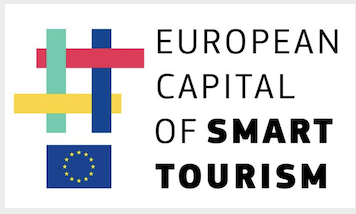
Pafos wins European Capital of Smart Tourism 2023
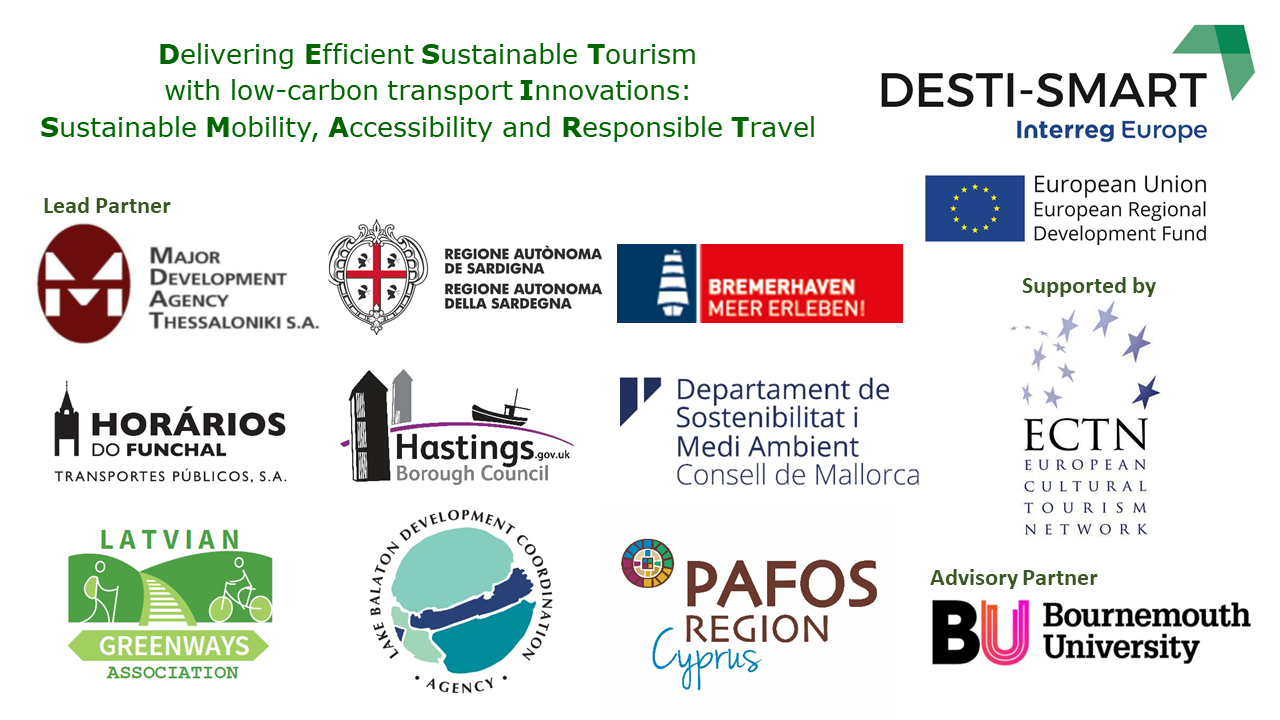
A Declaration on '‘Sustainable Tourism Mobility towards Smart Destinations’ is launched by the DESTI-SMART Partnership, as legacy of the Interreg Europe project
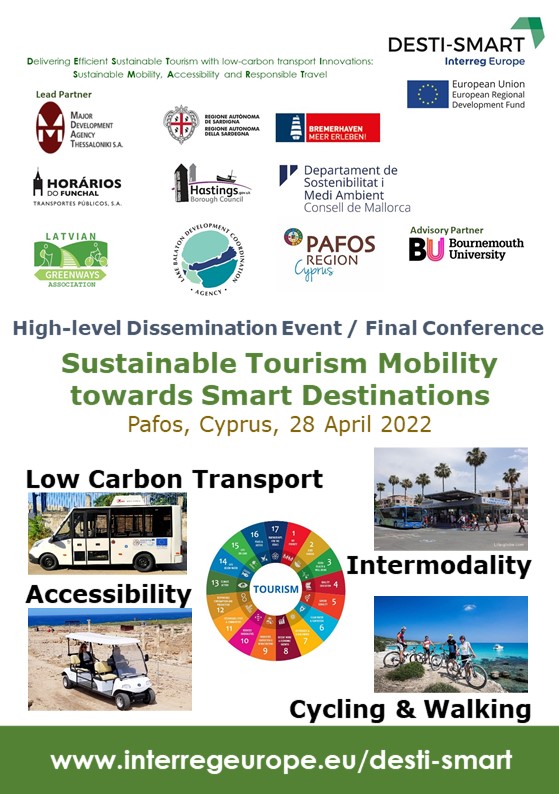
The high-level dissemination event / final conference was held in Pafos, Cyprus, on 28-29 April 2022, organised by partner Pafos Regional Board of Tourism
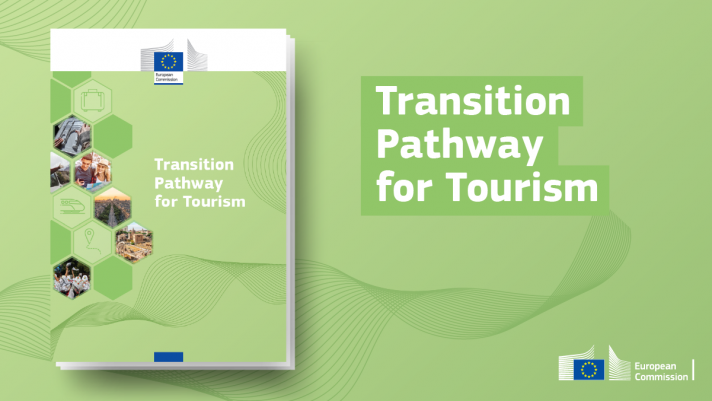
Synergies with the 'Transition Pathway for Tourism' on smart tourism mobility & accessibility identified, to be further developed by the DESTI-SMART partnership
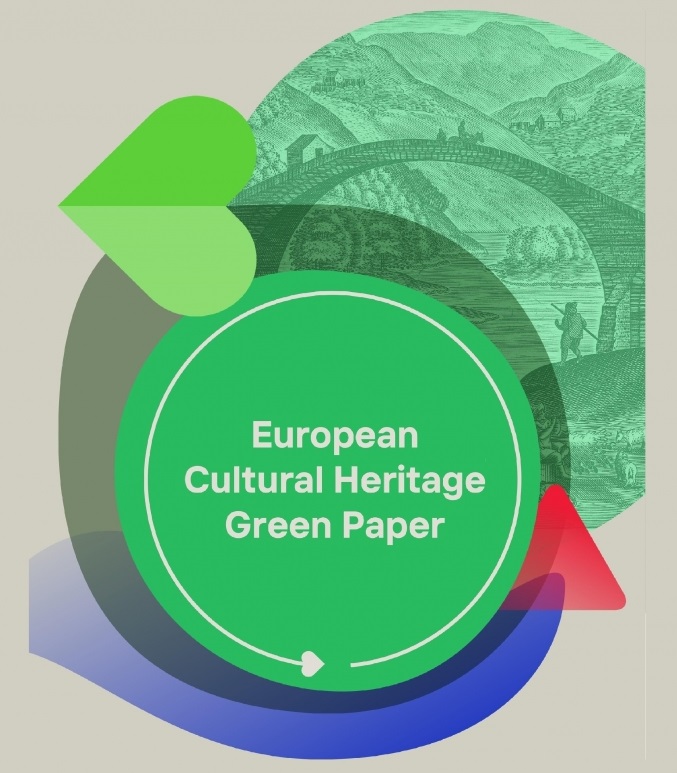
Recommendations on 'Accelerating the shift to sustainable and smart mobility' adopted by the DESTI-SMART Partnership
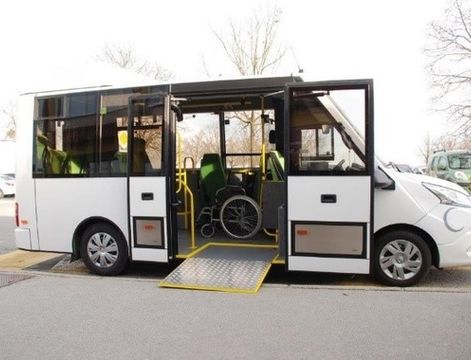
On the occasion of the International Day of Persons with Disabilities DESTI-SMART highlights strong support for Accessible Tourism for all
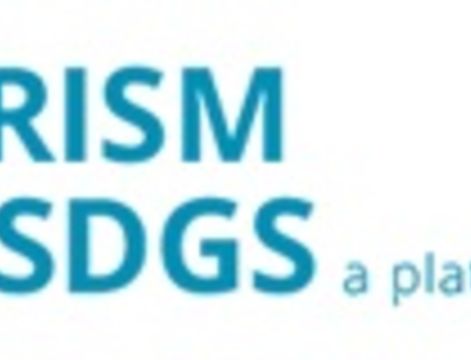
DESTI-SMART Project has been actively linked to the UN Sustainable Development Goals (SDGs) for 2030 (SDGs No: 7, 9, 11, 12, 13 and 17).
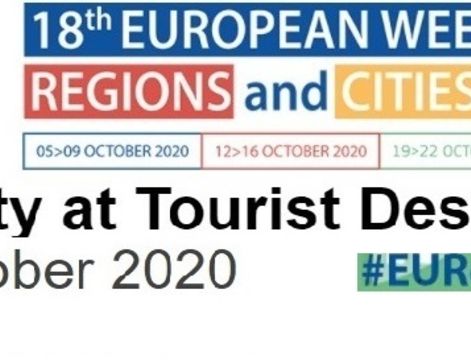
The DESTI-SMART Partnership held an oline Workshop at the European Wek of Regions and Cities digital event on: Smart Mobility at Tourist Destinations